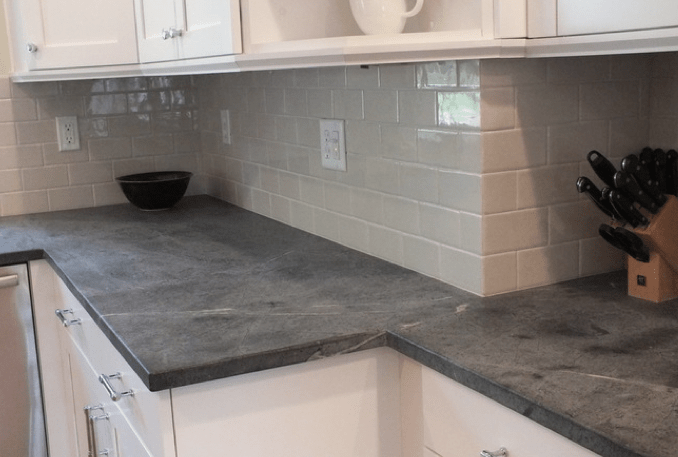Soapstone Wax and Oil
From the kitchen, to the bathroom, to an outdoor kitchen, soapstone counter and table tops add a flare of natural beauty to any decor style. How to finish soapstone is a personal preference, though your fabricator may have some input. Garden State Soapstone ™ recommends three ways to age your soapstone surface: with our very own organic soapstone oil, our organic soapstone wax made specifically for soapstone, or by leaving the soapstone natural.
Applying Soapstone Oil

Soapstone oil is a non-drying oil, meaning it does not evaporate but instead dissipates with time. That being said, our organic and food-safe soapstone oil is probably the most popular method to enhance and darken soapstone. Upon application, the stone turns a mix of very dark charcoal gray, blackish, or a dark green tone, depending on your soapstone variety.
Applying Soapstone Wax

The newest way to achieve the deep charcoal finish of soapstone is to apply a wax made specifically for the stone. Wax creates an even luster, resulting in a deeper, richer, smoother finish. It goes on quickly with little residue, and tends to be a cleaner product than oil.
However, it is harder to apply, so you’ll need a lot of elbow grease.
Leave As Is: Natural Soapstone Countertops

Most fabricators will suggest oil or wax to age, darken, and enhance your soapstone surfaces. But, unfinished soapstone surfaces are popular too. Keeping your soapstone unfinished allows for authentic aging and a beautiful gray color, but it may result in inconsistent patches in frequently used spots (around sinks and stoves).
Stay tuned! Our next blog will cover soapstone talc consistencies, and how different levels of hardness affect the aging process.
Have questions about wax, oil, or natural soapstone countertops? Just ask us!
Interested in our wax, oil, and other soapstone products? Visit www.soapstoneproducts.com.




Recent Comments